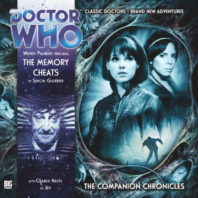
Released September 2011
Every character who has left the Doctor’s company has an immensely intriguing tale to tell, but perhaps nobody’s is quite as exciting as Zoe Heriot’s given how she must reconcile her eidetic memory with the glaring gap that stems from the fact that she can’t remember just why she did not take the opportunity to join the Doctor and Jamie in the first place. Picking up the narrative and thematic elements begun in ‘Echoes of Grey,’ Simon Guerrier’s ‘The Memory Cheats’ sees a mysterious company prosecuting Zoe because of its evidence from 1919 Uzbekistan that Zoe has travelled in time, something Zoe knows cannot be true despite her dreams saying otherwise.
Zoe being charged with thirty-six counts of criminal activity including sedition and extortion is a brilliant hook to the story, and the unique framing device shows an elder Zoe at odds with herself as apparent memories seem to break through the memory block the company assumes she has had put in place for some unknown reason by some unknown force. She is a woman who was brought up in a childhood without love and who joined the Elite programme where she learned how to take care of herself, and at times the story she tries to recall sees her take on a more menacing persona than usual that meshes quite well with the profile the company has on her. The anger stemming from her conflicting sense of self is at times palpable, and Wendy Padbury gives an amazing performance that recaptures everything that made Zoe such a strong and intelligent companion while also developing a more cunning shrewdness as she boldly tries to confront the ramifications of her present desire to shut down the Elite programme.
As strong as the framing device is, it’s perhaps unsurprising that the actual story being told can’t quite reach those same highs despite the ominous tension that constantly pervades the exciting setting of Teshkent. Indeed, an alien taking the local children is quite traditional in comparison, and it’s only the subtle touches like Jamie getting to know the children while Zoe tries to reconcile these wild and unstructured childhood conditions with her own which was eerily similar to what Chebrakov wants to build that further elevate the plot. That she lets the alien leave with the children so that they may grow up without prejudice is a surprising twist, however, and it’s this development that leads into the conclusion that is quite brilliant in its audaciousness despite not really answering what happened. Obviously the Doctor would never have allowed the children to be taken, but the actual end of this story is never revealed once Zoe boldly proclaims that she made it all up, using quick glances at the company’s documents and leading thoughts from her interviewer to craft a narrative and fill in the blanks along the way. Zoe trying to come to terms with the evidence of her involvement in these events despite no actual memory of being there creates a great sense of ambiguity and unreliable narration, but not providing a definitive conclusion does somewhat rob the central story of its impact.
Nonetheless, Padbury seemingly effortlessly bringing two differently-aged versions of Zoe to life holds everything together brilliantly, and Charlie Hayes gives a strong supporting performance within the framing device to ensure the pace and plot never lag. ‘The Memory Cheats’ doesn’t quite reach the upper eschelon of tales within The Companion Chronicles, but the performances, direction, and sound design match the script’s incredible ambition and provides Zoe’s strongest and most satisfying instalment yet.
- Release Date: 9/2011


Leave a Reply